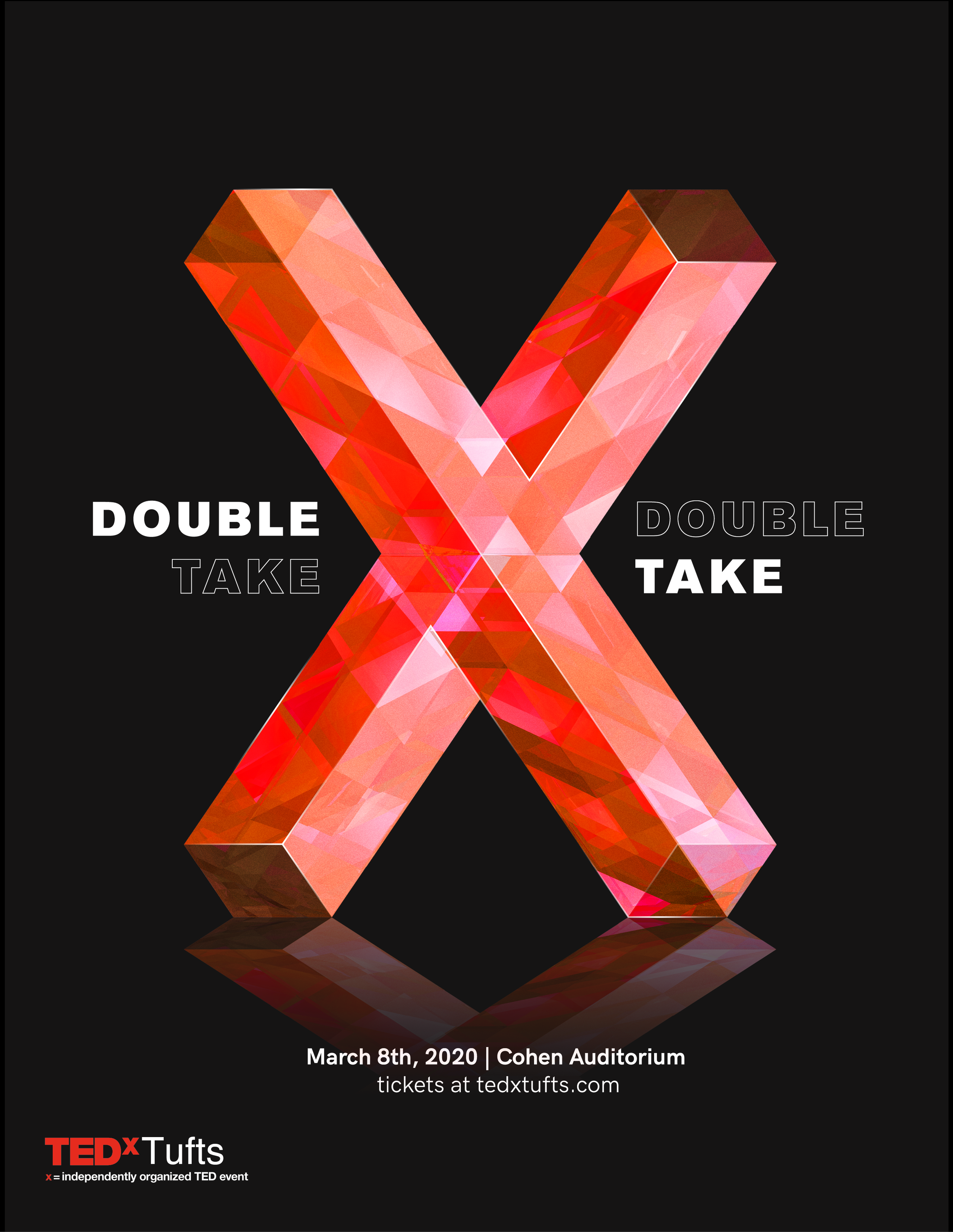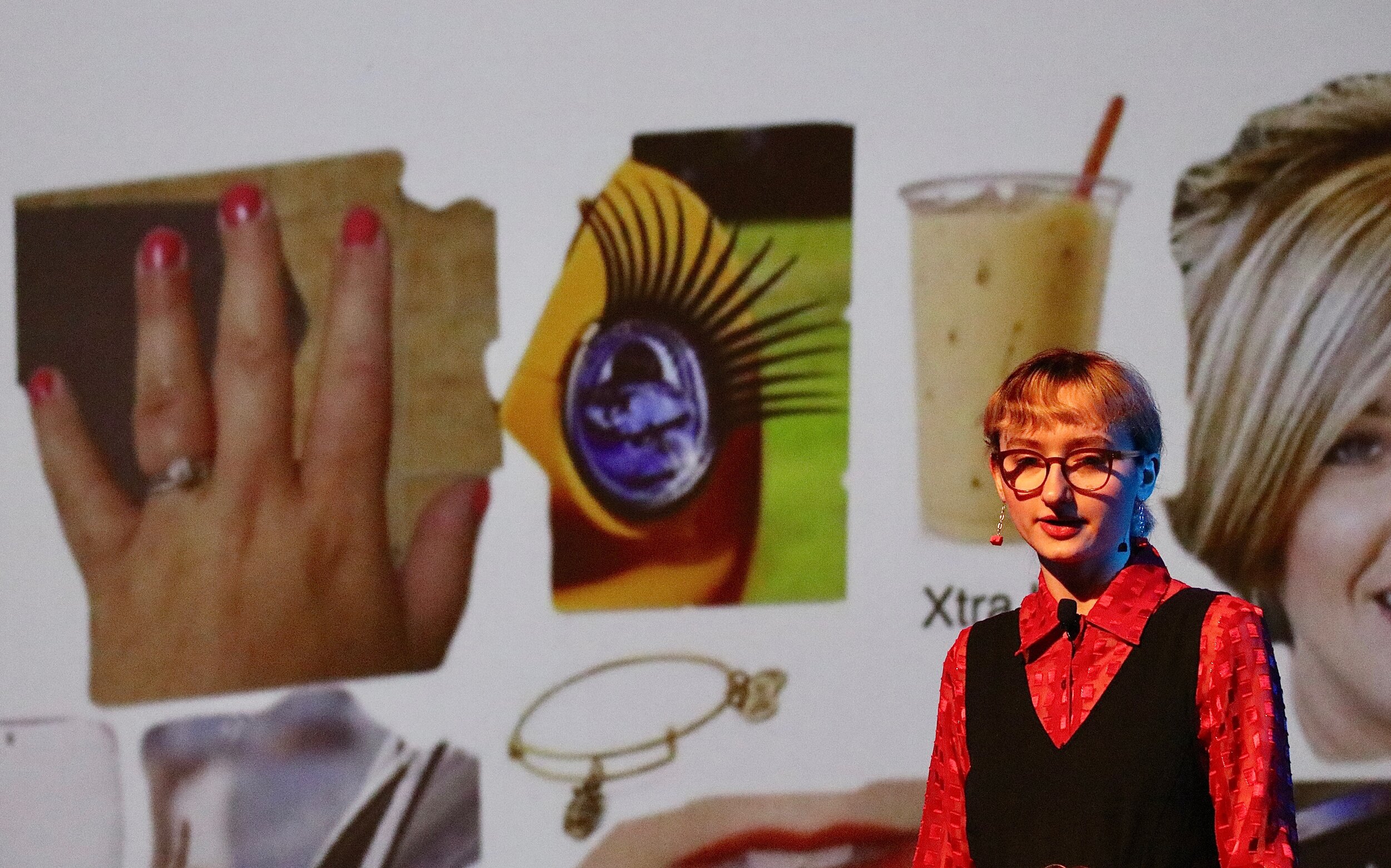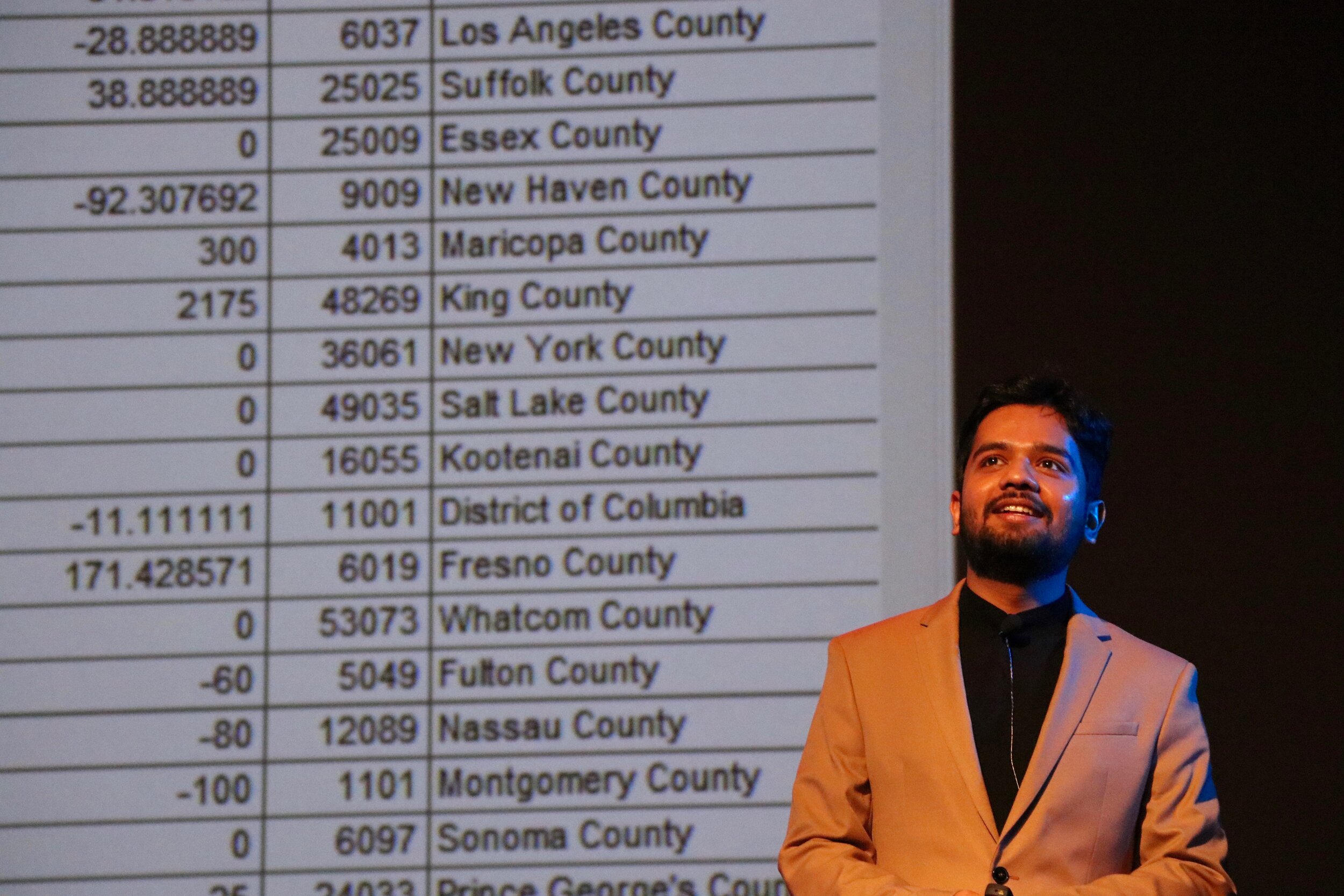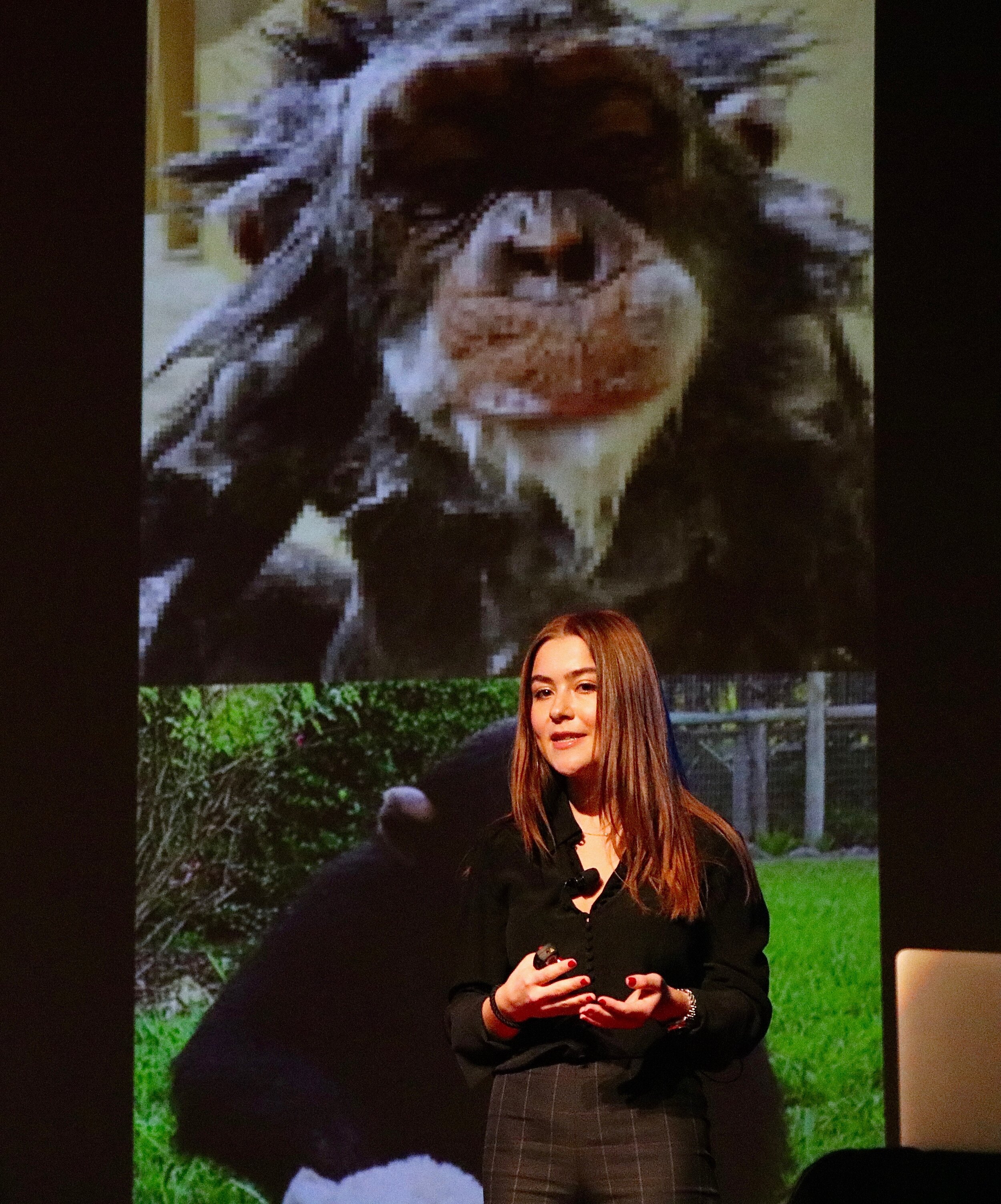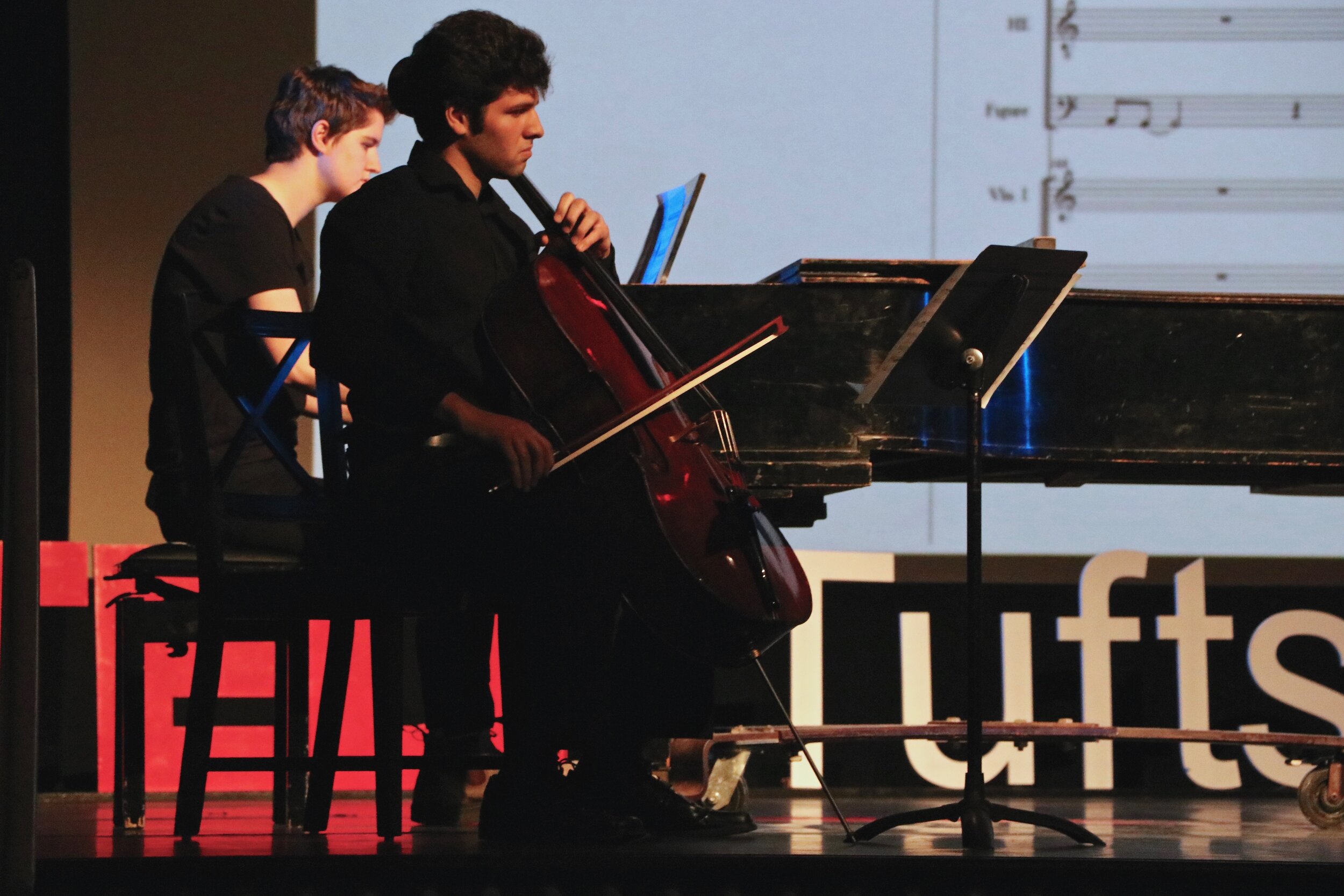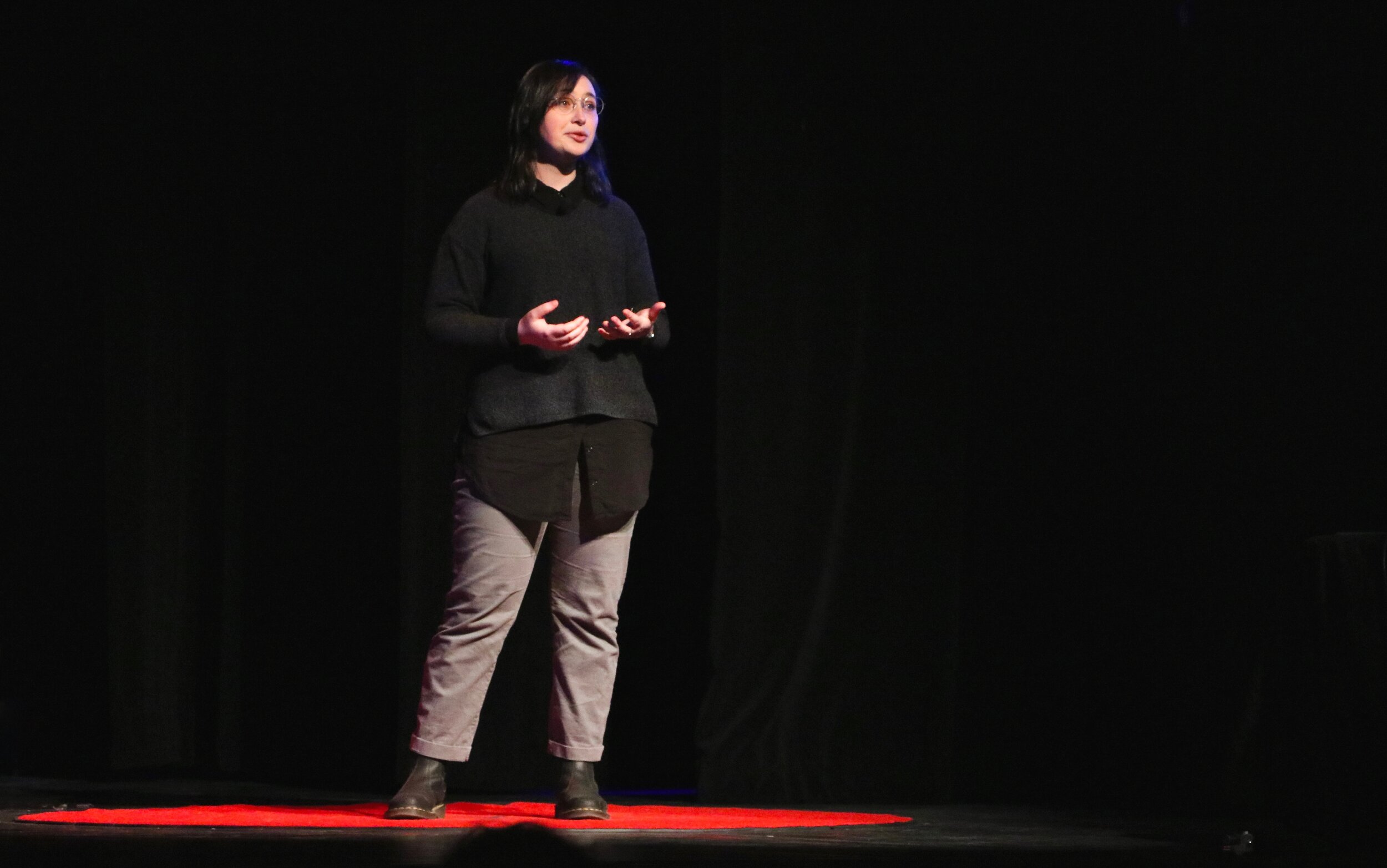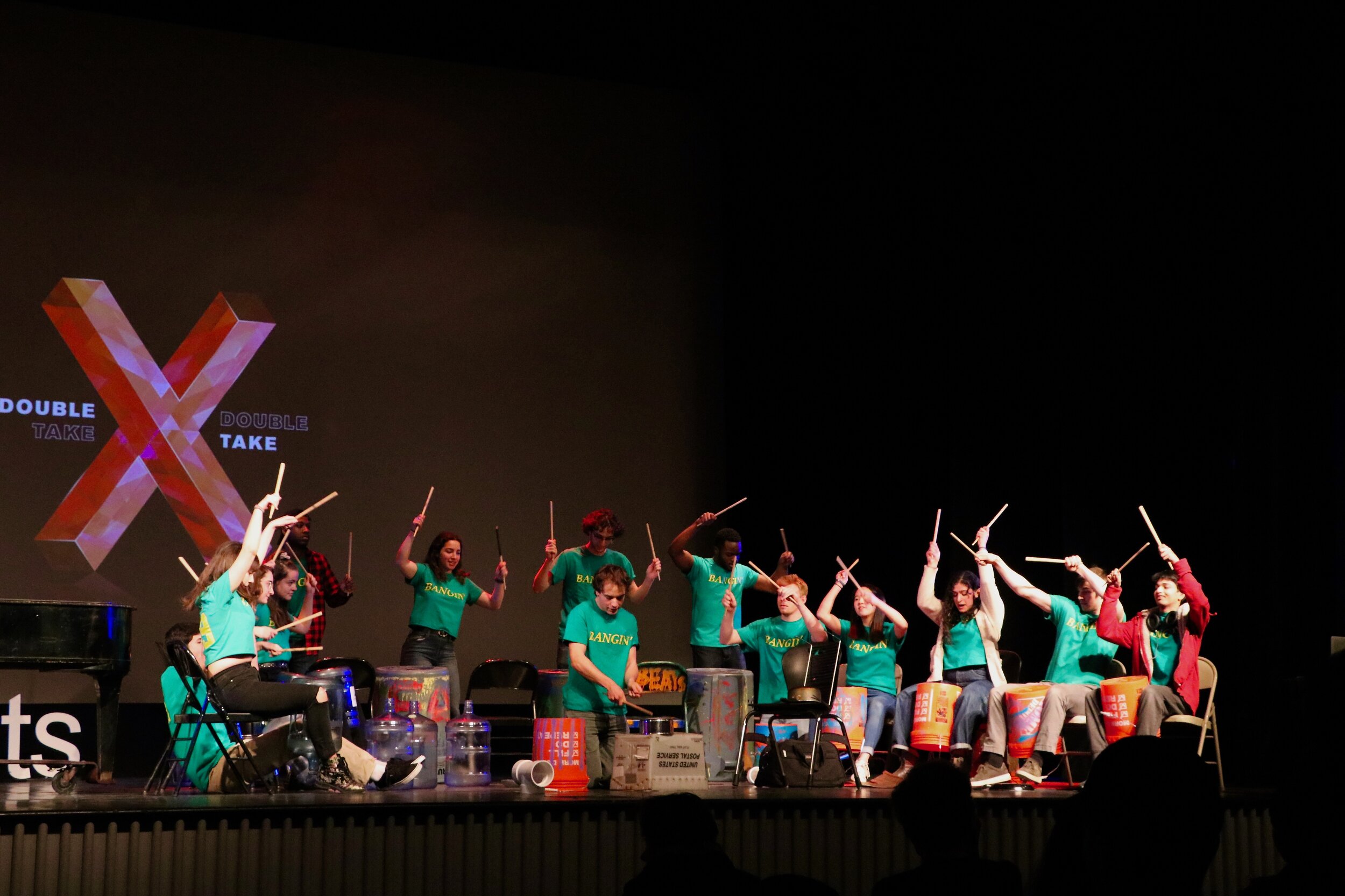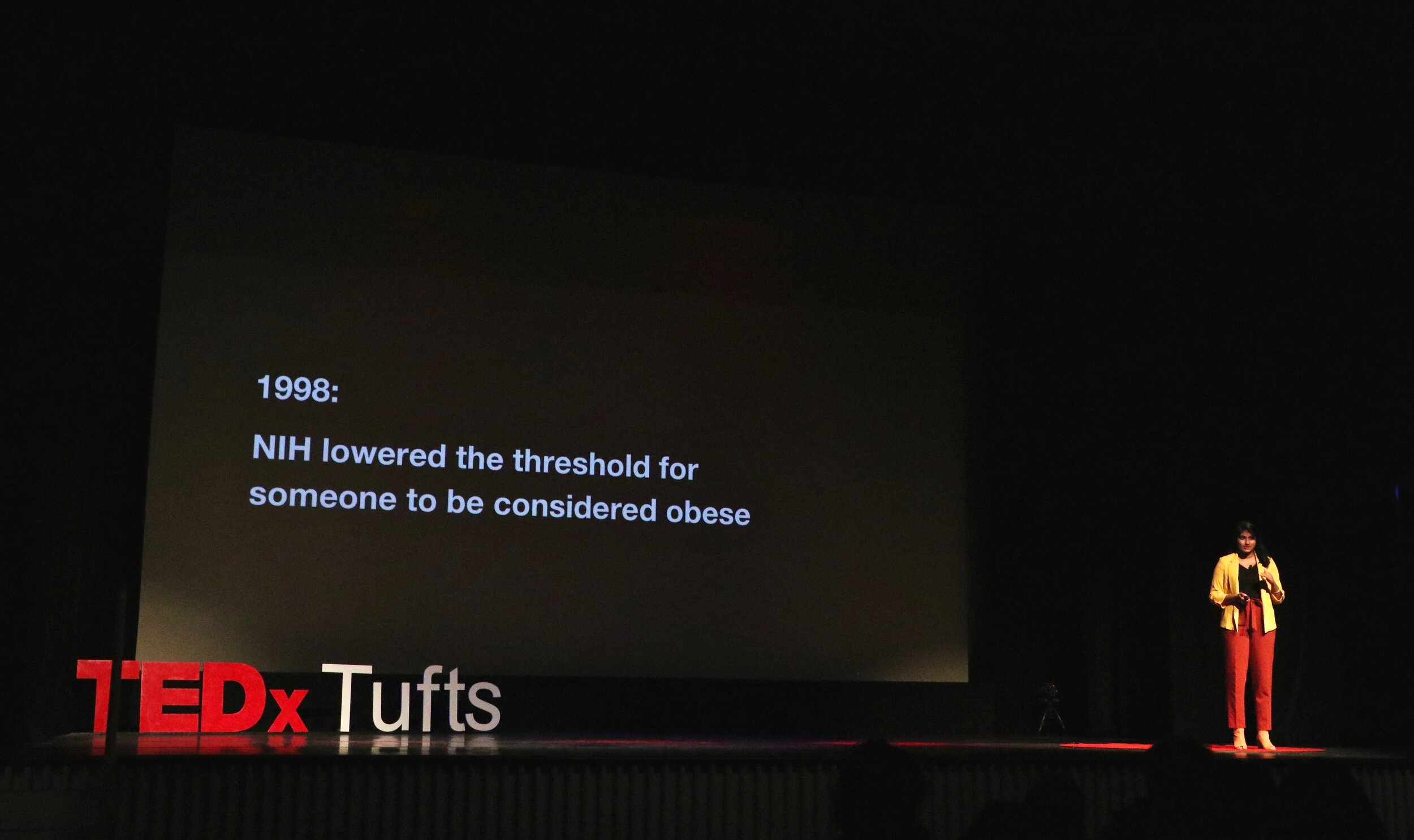
TEDxTufts is proud to present our 6th annual event and invites you to join us for a day of contemplation and idea-sharing, focused on the Tufts community and the world at large. This year’s theme is Double Take—a celebration of concepts that makes attendees re-examine their surroundings and take a closer look at ideas they may have initially passed by. Double Take is centered on both introspection and outward reflection, and the TEDxTufts team and our 2020 conference speakers hope you leave with an appreciation for close examination, both on campus and in other communities you may be a part of.
Double Take
2020
Talks:

As our lives become inseparable from the digital trails we leave behind, our privacy is increasingly at the mercy of those who control our data. By comparing this digital Dark Age to the field of medicine, data scientist Alyssa Rose examines the human impact of data collection, and proposes a Hippocratic Oath for data scientists. As a junior at Tufts studying data science and mathematics, Alyssa (she/her/hers) is thrilled to talk about her ideas on using data science for radical positive social change on this year’s TEDx stage. She spends most of her free time working on projects through the Tufts’ Students for the Exploration and Development of Space (SEDS) chapter, leading a data science group, and working for the Smithsonian’s Culture Heritage Rescue Initiative as a data science intern developing databases and a visualization website.

In this TEDx talk, Andrew Seligson discusses the life-changing experience of writing his first symphony. He details how the process of writing music and storytelling helps modern composers to create a space for catharsis and personal growth. Andrew Seligson (he/him/his) is a 1st year MALD student at the Fletcher School of Law and Diplomacy. Before joining the Tufts community, he worked in humanitarian response to the Syrian crisis in Jordan, as well as at the United Nations in New York. Andrew is also an avid composer and guitarist, having written and produced three operas, a symphony about Lord of the Rings, and numerous pieces for chamber ensembles. As a guitarist, he has performed in master classes with Tommy Emmanuel, John Knowles, and Guthrie Govan. Most recently, he produced and performed an original opera at the Juilliard School of Music.

Athena Nair speaks about fatphobia, diet culture, and body positivity in her TEDx Talk. She draws from her own personal experiences and her work with The Body Positive to explore the pervasiveness of fatphobia in our lives. She unpacks the history of the BMI, discrimination against fat folks in the medical industry and beyond, and offers a first step to opt out of diet culture: radical self-love. For more resources, information, and more of Athena's thoughts on these topics, visit her blog and website here: https://19anair.wixsite.com/beingbodypositive
Athena (she/her/hers) is a freshman at Tufts, coming from the San Francisco Bay Area. She has been passionate about social activism for as long as she can remember. In addition to focusing on racial, gender, sexual orientation, and class identities, Athena devotes herself to body positivity and body liberation. The body positive and body liberation movement is dedicated to dismantling the fatphobic diet culture that we find ourselves entrenched in–a culture that allows us to ignore and marginalize certain kinds of bodies. Athena aims to serve as a body positive role model, and to spread awareness about the intersectionality of body oppression.

With each passing year, more and more of our information is being collected without our knowledge. In this talk, Ben Ballard shares how even the most intimate data about your body is no longer under your control, and how it might be used in ways you might not like. Ben Ballard (he/him/his) is a second-year MALD with a focus on International Information & Communication, and Development. He is currently conducting work in ICT4D, International digital privacy and security, and digital governance. His work with the Electronic Frontier Foundation as a Google Public Policy Fellow covered digital surveillance, online censorship, data privacy, and cross-border data flows. This summer he will be joining The Citizen Lab as a Cybersecurity Fellow.

After exploring different storytelling mediums in 5 countries, Fletcher School of Law and Diplomacy student Devang Shah unveils his latest original creation on the stage of TEDxTufts. His talk explores the best way to capture audiences and spark change in both the fictional and non-fictional worlds and the blurring lines between them. For the first time ever, he uses Geographic Information System (GIS) to tell the tale of an idea and deciphers reality with creative storytelling. Devang’s (he/him/his) penchant for exploring different mediums of storytelling led him to begin his career as journalist and documentary filmmaker for the Kashmir Observer. He then worked as broadcast journalist in Ghana for a national media house called Metro TV. He is most proud of producing a first-of-its-kind report on the LGBTQ+ community of Ghana, which was broadcasted nationally. He has also served at the Parliamentary Monitoring Group, as a Monitor for the Parliament of South Africa, Cape Town.
In his time at the Fletcher School of Law & Diplomacy, he has taken a deep dive into international policies and innovative mediums to explore them. He spent the first half of his summer on a fellowship with the International Rescue Committee (IRC) in Ethiopia and the second half working for Emmy Award-winning documentary filmmakers at Transform Films in NYC. He is excited to share his latest project, which uses geospatial technology to bring these worlds closer than ever.

This talk is about the constant struggles many children face due to social disparities. Jose Avila draws on his childhood experiences to reflect on how constant stress has both psychological and physiological health effects that negatively impact children for life, and offers a key solution: mentorship. Through mentorship, we can help lessen these effects by offering support, advice, and resources. Jose (he/him/his) is a senior at Tufts studying Biology and Child Studies & Human Development. He has been passionate about changing the lives of children ever since he became the older brother and essentially third parent to his two brothers, Jovannie and Angel. While at Tufts he has combined his passions for children and health by volunteering as a Team Leader for Jumpstart at Tufts and working as an EMT at Cataldo Ambulance Services near campus. Jose wants to share his experiences with you and how it led him to his passion for change. He is extremely excited to talk to you about the health effects of social disparities in early childhood and how we can all contribute towards change through the education system!

In "How to be an Auntie" drag queen LaWhore Vagistan describes how she learned the art of auntie-ing from the South Asian women that raised her, from popular and political figures like Anita Yavitch and Maxine Waters, from feminist scholars and artists, and from LGBT elders that offer mentorship and care across generations. She shows how the figure of the auntie is often stereotyped as overbearing, unfashionable, and frankly exhausting, but that the very traits that make aunties so irritating are actually valuable to social change and public good. LaWhore Vagistan/Kareem Khubchandani (all pronouns) is the Mellon Bridge assistant professor in the department of theatre, dance, and performance studies, and the program in women’s, gender, and sexuality studies at Tufts University. He is developing several book projects include: Ishtyle: Accenting Gay Indian Nightlife; Decolonize Drag!; Queer Nightlife (co-edited with Kemi Adeyemi and Ramón Rivera-Servera); and Auntologies: Queer Aesthetics and South Asian Aunties. LaWhore Vagistan/Kareem is also a performance artist working in drag, storytelling, body art, theater, and digital media. He holds a Ph.D. in performance studies from Northwestern University.

This talk explores some of the many means through which we communicate with each other, both visual and otherwise. Lily Pisano uses the format of memes, both online and off, as a lens to investigate notions of relatability, collective and individual consciousness, and identity. Drawing on her own experience of becoming a viral meme, Pisano asks us to reflect on and rethink the ways we create meaning in the world around us. Lily Pisano (she/her/hers) is a fourth-year student in the five-year Combined Degree Program. Her main studies at Tufts are Japanese (she spent last year abroad at Kanazawa University) and Gender/Sexuality Studies; at SMFA, her BFA is focused on welding, fiber arts, and painting. As a freshman, Lily was a co-founder and is currently an editor of Currents magazine, an arts-focused publication exhibiting the artwork of both Medford and Fenway artists (@currentsmag). She is a Creative, a Maker, and the source of a viral Internet meme based on a picture taken of her as a child.

Does watching someone fall apart on stage give you secondhand embarrassment? Do you think you have stage fright? Are you nervous to to perform your gender on a daily basis? “Gender Rehearsativity” discusses the expansive, freeing, and experimental ways that playing with gender in theatrical rehearsal and acting classrooms can be applied to our everyday lives. Pulling from their own experiences as a nonbinary theatre educator, professional actor, and director, Rezes even riffs on the TEDxTalk form with a new take on a classic half-and-half performance style. Jo (they/them/theirs) is a second year M.A./Ph.D. student in Theatre and Performance Studies at Tufts University currently writing an auto-ethnographic thesis which explores queer time ruptures and the disintegration of bodies in Camp performance spaces. Since beginning their career as a theatremaker at Vassar College, Jo has worked to disrupt the gender binary on and off the stage as an actor, director, and educator in the Greater Boston Area. Most recently, they’ve had the irreverent joys of playing Dr. Frank N. Furter in Entropy Theatre Company’s New England Tour of The Rocky Horror Show, assistant directing The Nora Theatre Company’s Cloud 9, teaching workshops on gender-bending at Somerville Arts for Youth, and instructing Introduction to Acting in the Department of Theatre, Dance, and Performance Studies at Tufts.

How would the world change if artists and scientists more frequently exchanged ideas and created in collaboration? Madeline Weir reflects on her time at Arts at CERN, an artist-in-residency program at the European Center for Nuclear Research. By sharing an inside view of the way artists and scientists can work together and spark creative ideas, her talk highlights the value of interdisciplinary exchanges. Madeline Weir (she/her/hers) is a senior double majoring in International Relations - Economics, and Film & Media studies. She’s excited to discuss the collision of art and science and to talk about how we need to embrace interdisciplinary collaborations. This past summer, she worked at CERN, the European Center for Nuclear and Particle Physics Research. Her work there was to see how their artists-in-residence and scientists engage with one another and inspire each other’s work. Currently, she is working for NOVA with PBS-WGBH producing documentary-style media for scientific communication.

Global crises and revolutions are demanding a new type of leader. The traditional style of command and control leadership - a heavily masculine one- has caused disastrous consequences, whereas a more empathetic, inclusive form of leadership - a more feminine one- has thrived. Using case studies from the climate movement, the Armenian revolution, and the Chilean protests, this talk introduces a new way to practice power and makes the case for women to lead. Samantha Karlin (she/her/hers) is the founder and Chief Executive Officer of Empower Global. She consults organizations on how to better recruit, retain, and advance women, create male allies, and foster inclusive environments that enable people from all backgrounds to thrive. She is currently also advising on Apollo, a community building app for men. Her background spans the public and private sectors, from tech to politics to foreign affairs. Her most recent role was the Director of Global Community at a venture backed tech startup in Silicon Valley, CommonGenius. Before that, Ms. Karlin was the Director of Global Engagement & Gender Equality at Ashoka, where she focused on accelerating Ashoka’s female entrepreneurs. Ms. Karlin speaks around the world and does workshops around gender issues.

TJ discusses her internship at Fauna Foundation, the only chimpanzee sanctuary in Canada, where she witnessed the lasting impact of captivity and abuse on former pet, performer, and research chimps. She connects the experiences of the Fauna chimps to those of captive wildlife in general who are frequently commodified — and mistreated — for the sake of human entertainment, and she stresses the importance of engaging responsibly with wildlife in-person and online.
TJ Robins (she/her/hers) is a Tufts senior double-majoring in biology and anthropology. Next year, she’ll be attending the Cummings School of Veterinary Medicine where she plans on studying zoological/conservation medicine. TJ is really excited to discuss her experience interning at a chimpanzee sanctuary where she was able to care for and study chimps retired from cross-fostering research, biomedical research, and zoos. In working with the chimps, TJ became increasingly aware of the ethical problems associated with keeping and/or interacting with captive primates and captive animals in general. She’s inspired to give a TEDx talk on the ethics of “captive wild animal encounters” to spread awareness about the issue.

